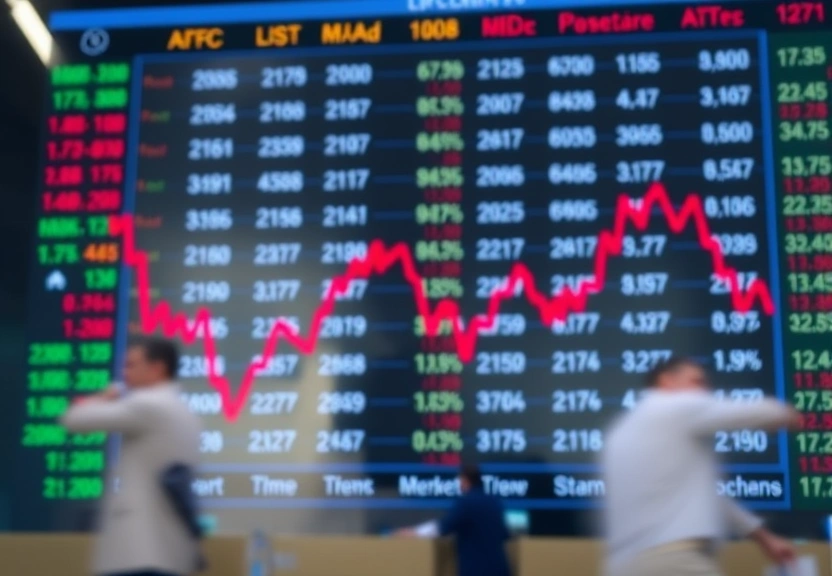Dutch Stocks Decline at Market Close; AEX Index Falls 0.20%
The latest trading session has seen a notable decline in Dutch stocks, with the AEX Index closing down by 0.20%. This downturn reflects a broader trend of market fluctuations that have been impacting stock markets globally. Amid concerns over economic conditions, geopolitical tensions, and inflationary pressures, investors are carefully monitoring their portfolios and market movements.

As the AEX Index, which is a key indicator of the Dutch stock market, takes a dip, analysts are weighing the implications of this decline for both domestic and international investors. In this article, we will explore the factors contributing to the decline, the performance of key sectors, and what this means for investors looking to navigate the current financial landscape.
Understanding the AEX Index and Its Significance
The AEX Index, short for Amsterdam Exchange Index, is a stock market index composed of the 25 largest companies listed on the Euronext Amsterdam stock exchange. This index is critical for measuring the overall performance of the Dutch equity market and serves as a barometer for investor sentiment. The AEX Index is often used by investors to gauge the health of the Dutch economy, making it a vital tool for both local and international stakeholders.
Importance of the AEX Index in Financial Markets
The AEX Index holds significant importance for several reasons:
- Economic Indicator: It reflects the performance of major Dutch companies, providing insights into the overall economic conditions.
- Investment Benchmark: Many investment funds benchmark their performance against the AEX, making it a key metric for fund managers.
- Market Sentiment: The movements of the AEX can indicate investor confidence, influencing trading strategies and decisions.
Factors Contributing to the Decline
The recent decline in the AEX Index can be attributed to several interrelated factors, each contributing to heightened market volatility:
1. Economic Uncertainty
Economic uncertainties, both domestically and globally, have been a persistent theme in recent months. As inflation rates rise and consumer spending fluctuates, investors are becoming increasingly cautious. The uncertainty surrounding monetary policies from central banks, particularly the European Central Bank (ECB), further complicates the situation.
2. Geopolitical Tensions
Geopolitical tensions, particularly in regions affecting trade and energy supplies, have led to increased market volatility. Investors are wary of potential disruptions that could impact the global economy and, by extension, the performance of Dutch companies.
3. Sector-specific Challenges
Different sectors within the AEX Index are facing unique challenges. For instance, technology stocks have been under pressure due to rising interest rates and supply chain disruptions. Similarly, energy stocks are grappling with fluctuating oil prices and the transition towards renewable energy sources.
4. Investor Sentiment
The overall sentiment among investors has shifted towards a more risk-averse stance. As a result, many are opting to liquidate positions in the face of uncertainty, leading to broader market declines. This sentiment is often reflected in the trading patterns observed in the AEX Index.
Key Sectors Impacted by the Market Decline
As the AEX Index declines, certain sectors have been more significantly affected than others. Understanding these impacts can provide investors with insights into potential opportunities or risks.
1. Technology Sector
The technology sector has seen notable declines, with many tech stocks losing value amid concerns over rising interest rates and inflation. Companies that rely heavily on growth and future earnings are particularly vulnerable in such an environment.
2. Financial Sector
Financial institutions are also feeling the effects of market turbulence. Uncertainty surrounding interest rates and the potential for economic slowdown can impact banks’ profit margins and lending practices.
3. Consumer Goods Sector
Consumer goods companies are facing challenges due to rising costs and changing consumer behaviors. As inflation affects purchasing power, companies in this sector must navigate a complex landscape to maintain profitability.
4. Energy Sector
The energy sector is experiencing mixed outcomes. While some companies benefit from high oil prices, others are struggling with supply chain disruptions and the transition to sustainable energy sources. This complexity creates both opportunities and risks for investors.
What This Means for Investors
The decline in the AEX Index signals a need for investors to reassess their strategies. Here are some key considerations:
- Diversification: Investors should consider diversifying their portfolios to mitigate risks associated with sector-specific declines.
- Focus on Fundamentals: Analyzing the fundamentals of companies within the AEX can provide insights into long-term investment potential.
- Stay Informed: Keeping abreast of economic indicators and market trends will help investors make informed decisions.
- Consider Defensive Stocks: In uncertain times, defensive stocks, which tend to perform better during market downturns, may be worth considering.
Frequently Asked Questions (FAQ)
1. What is the AEX Index?
The AEX Index is a stock market index that tracks the performance of the 25 largest companies on the Euronext Amsterdam stock exchange. It serves as a benchmark for the Dutch stock market.
2. Why did the AEX Index decline by 0.20%?
The decline can be attributed to various factors, including economic uncertainty, geopolitical tensions, and sector-specific challenges that have led to a cautious investor sentiment.
3. How can investors protect their portfolios during market declines?
Investors can protect their portfolios by diversifying investments, focusing on fundamentally strong companies, and considering defensive stocks that tend to perform well in downturns.
4. What sectors are most affected by the current market conditions?
The technology, financial, consumer goods, and energy sectors have been significantly impacted by the recent market decline, each facing unique challenges.
5. Is it a good time to invest in Dutch stocks?
While market declines can present buying opportunities, investors should conduct thorough research and consider their risk tolerance before making investment decisions.
Conclusion
The decline of the AEX Index by 0.20% highlights the complexities facing the Dutch stock market amid a backdrop of economic uncertainty and geopolitical tensions. Investors must remain vigilant, adapting their strategies to navigate this challenging environment. By understanding the factors contributing to the market decline and the sectors most affected, investors can make informed decisions that align with their financial goals.
As always, maintaining a diversified portfolio and staying informed will be key strategies for weathering the storm of market fluctuations. The current landscape may present challenges, but it also offers opportunities for those prepared to adapt and respond to changing conditions.
📰 Original Source
Este artigo foi baseado em informações de: https://www.investing.com/news/stock-market-news/netherlands-stocks-lower-at-close-of-trade-aex-down-020-4193135


